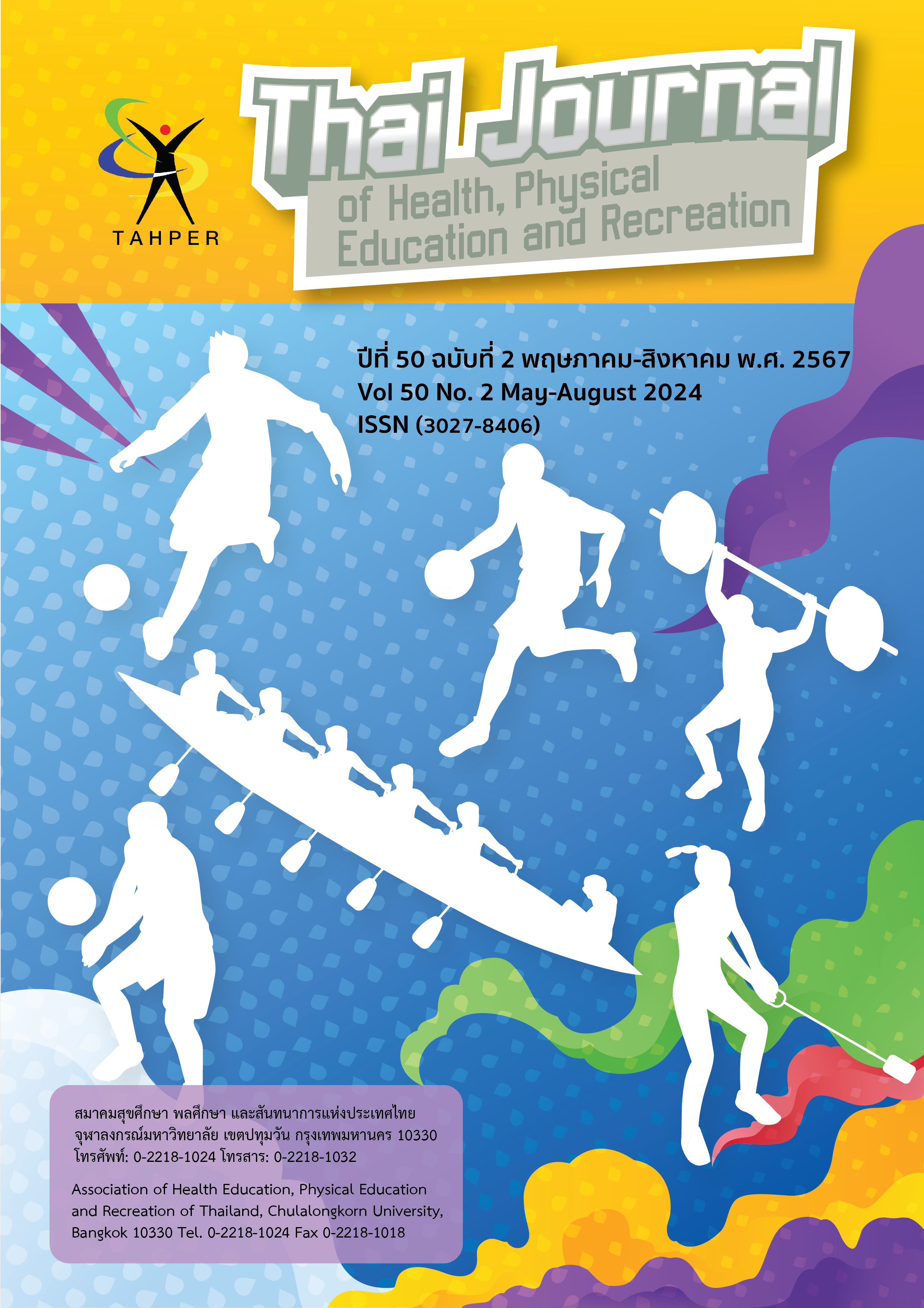Health Education Learning Management by Problem-Based Learning to Promote Digital Quotient for Cyber Bullying Prevention of Matthayom 3 Students
Main Article Content
Abstract
The purpose of this quasi-experimental research was to study the effectiveness of health education learning management by problem-based learning to promote digital quotient for cyber bullying prevention of Matthayom 3 students. The 83 participants were selected by multistage sampling. They were 41 and 42 participants in the experimental group and the comparison group respectively. The experimental group participated in active learning management activities for 4 weeks. The comparison group participated in 4 regular health education classes. Questionnaire developed by the researcher was used as an instrument to collect data. Data analysis was made for frequency, percentage, mean, standard deviation, Paired – sample t – test and Independent – sample t – test.
The results of the study revealed that after the experiment, the experimental group had higher average scores in digital intelligence quotient for cyber bullying prevention than before the experiment (p ≤ .05) in two aspects namely cybersecurity management and cyberbullying management. More over the experimental group had a higher average scores in digital intelligence quotient for cyber bullying prevention than those in the comparison group (p ≤ .05) in 3 aspects namely critical thinking, cybersecurity management and cyberbullying management.
Article Details

This work is licensed under a Creative Commons Attribution-NonCommercial-NoDerivatives 4.0 International License.
Critical thinking in journals is the right of the author. The Association of Health Education, Physical Education and Recreation of Thailand is not always required, to create diversity in ideas and creativity.
ความคิด ข้อวิพากษ์ในวารสารเป้นสิทธิของผู้เขียน สมาคมสุขศึกษา พลศึกษา และสันทนาการแห่งประเทศไทยไม่จำเป็นต้องเห็นชอบด้วยเสมอไป เพื่อให้เกิดความหลากหลายในความคิดและความสร้างสรรค์
References
กรมสุขภาพจิต กระทรวงสาธารณสุข. (2561). อย่าปล่อยให้เด็กถูกกลั่นแกล้งในโลกออนไลน์ (Cyber Bullying). สืบค้นเมื่อ 16 กันยายน 2562, สืบค้นจาก https://www.dmh.go.th/news-dmh/view.asp?id=28079.
ณัฐพล นิมมานพัชรินทร์. (2561). แบบสำรวจออนไลน์ DQ Screen Time Test. สืบค้นเมื่อ 1 ตุลาคม 2562, สืบค้นจาก https://www.thaihealth.or.th/Content/41463-ผลสำรวจพบเด็กไทยติดอินเทอร์เน็ตสูงกว่าเฉลี่ยโลก%20.html.
ทิศนา แขมมณี. (2550). ศาสตร์การสอน : องค์ความรู้ เพื่อการจัดการกระบวนการเรียนรู้ที่มีประสิทธิภาพ. (พิมพ์ครั้งที่ 2). กรุงเทพฯ: โรงพิมพ์แห่งจุฬาลงกรณ์มหาวิทยาลัย.
สุนิสา จันทร์แสง. (2563). ปัจจัยที่มีความสัมพันธ์กับพฤติกรรมเสี่ยงทางเพศจากการใช้อินเทอร์เน็ตของนักเรียนชั้นมัธยมศึกษาตอนต้น ในอำเภอเมือง จังหวัดสุพรรณบุรี. Nursing Journal of the Ministry of Public Health, 2(30), 121-135.
สุรางคณา วายุภาพ. (2561). รายงานผลการสำรวจพฤติกรรมผู้ใช้อินเทอร์เน็ตในประเทศไทยปี 2561. (พิมพ์ครั้งที่ 1). สำนักยุทธศาสตร์ สำนักงานพัฒนาธุรกรรมทางอิเล็กทรอนิกส์ (องค์การมหาชน) , กระทรวงดิจิทัลเพื่อเศษฐกิจและสังคม.
โสภา ชดช้อย. (2560). ผลการจัดการเรียนรู้วิชาสุขศึกษาโดยใช้ปัญหาเป็นฐานและทฤษฎีประมวลสารสนเทศทางสังคมที่มีต่อผลสัมฤทธิ์ทางการเรียนและความสามารถในการแก้ปัญหาพฤติกรรมการกลั่นแกล้งทางโลกออนไลน์ของนักเรียนชั้นมัธยมศึกษาปีที่ 2. วิทยานิพนธ์ปริญญาโท, จุฬาลงกรณ์มหาวิทยาลัย.
Craig Winston J. (2009). A cross-national profile of bullying and victimization among Health Education Reserch. 20(1), 81-91.
John Dewey. (1996). Philosophy, Education, and Reflective Thinking. In Thomas O.Buford Toward a Philosophy of Education. pp.180-183.
Park Yuhyun. (2019). DQ Global Standards Report. DQ Institute 2019. Retrieved May, 16, 2020. From http://www.dqinstitute.org/dq-framwork.


